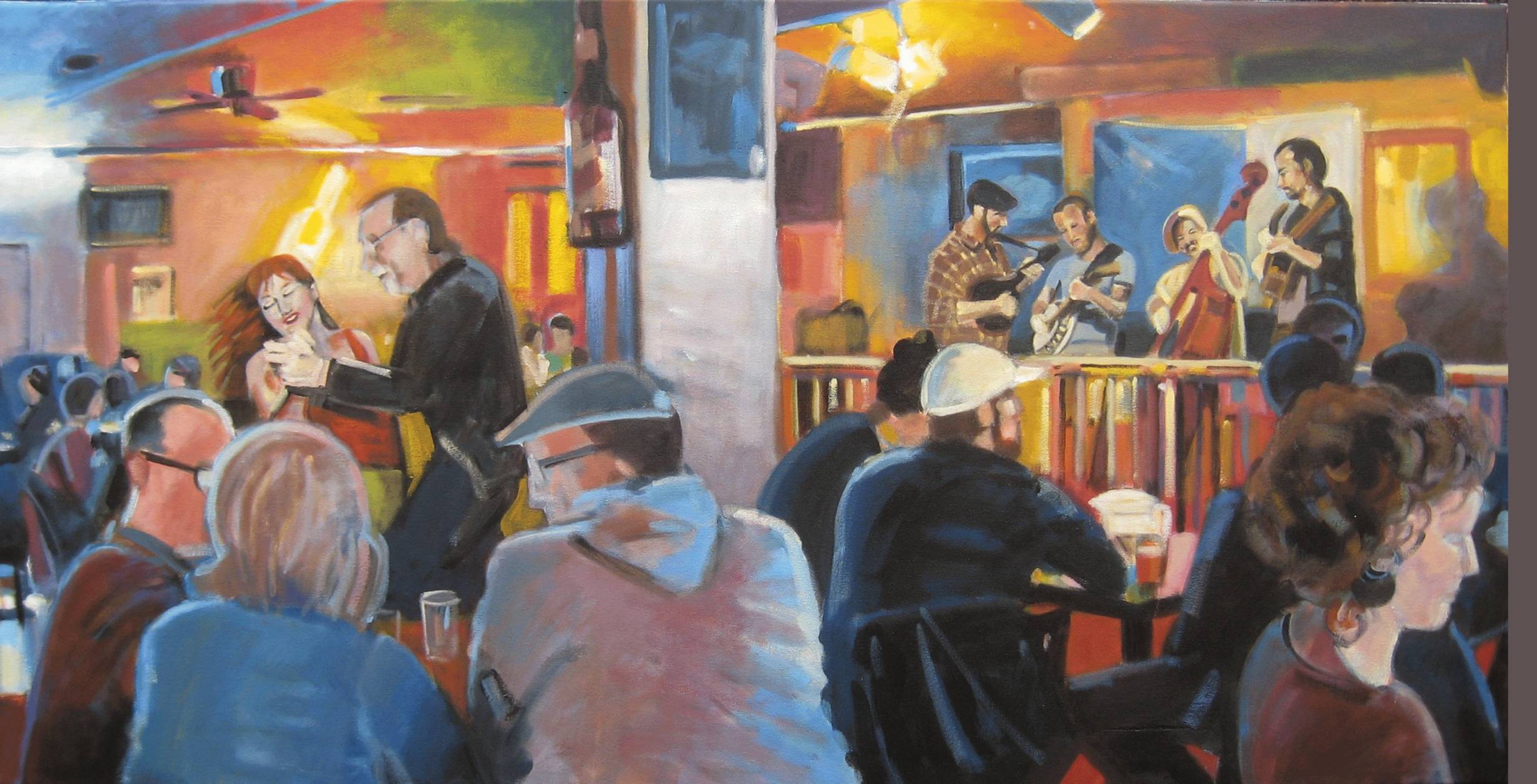Local bluegrass quartet Black Coffee Fridays’ debut album, See You at the Hootenanny, is a beautifully arranged mix of traditional bluegrass tunes and charming originals, each with its own story to relay. The band released their new record at The Iron Post on Sunday evening, playing to a full house of exuberant friends and fans. The band played two sets throughout the evening, offering up a blend of originals from their new album, traditional jams, and even some new, unnamed original work. Many got up to cut a rug up front by the band, filling the room with more smiles and more laughs. The night felt like a true celebration.
Band mates Cody Jensen (banjo, vocals), Charlie Harris (bass, vocals), Sam Payne (mandolin, vocals), and Phil Alley (guitar, vocals) began playing together as Black Coffee Fridays just about one year ago. Much of the band’s practicing and performing went down every Monday night at Rose Bowl Tavern during the venue’s open jam night, an event known as the Urbana Hootenanny. Previously, Black Coffee Fridays had been comprised of various other combinations of artists, though Harris has been a part of the project since its inception. Alley was the last member to join this current combination of players. After months of solid playing together, the guys began tossing around the idea of putting a record together in early December of last year. The idea inspired an influx of original songs, so it wasn’t too long before they had a full album’s worth of tunes to record.
The album is wonderfully crafted in so many respects. The original compositions are aesthetically pleasing, as you’d expect from traditional bluegrass, but they’re also experimental enough to keep you listening for that fresh touch. The lyrics are sometimes sweet, sometimes solemn, and sometimes quite funny. Sometimes the songs’ stories are fictional, and other times they hit painfully close to home. But regardless of the sentiment, each original is brimming with a sincerity that’s so apparent through the whole record. My first listen through See You at the Hootenanny was such a good experience. I felt like I was sitting down with these guys for story time. The lack of effects or lengthy instrumental fills on the recordings only reinforces that kind of profound sincerity. The sound is intimate, clean, and honest. The way you hear Black Coffee Fridays play on the record is the same way you hear them live. No nonsense here, folks.
The progression of the tracks is fluid and fitting, almost like the dramatic structure of a story itself: exposition, rising action, climax, falling action, and resolution. The album opens with a traditional bluegrass tune, “Roving Gambler,” which lays an exciting foundation for the rest of the album and pays a humble tribute to the genre’s deep-running roots. A run of originals by Harris and Jensen (respectively) follow the opening of the album, establishing Black Coffee Fridays’ unique style and sound. The album reaches a stylistic climax with the song “Jill’s Family.” This original collaboration from Harris and Alley is distinctly different from the rest of the album in the best possible way. A percussive mandolin part and jazzy contributions from the guitar give the song a rock feel and qualify it as distinctly newgrass. This dreamy track helps to tell the fictional story of a family whose mother has passed away as they reflect on her memory with love and adoration. “Last Train Out” slows the pace of the record as Alley croons about jumping on the last train out of town to find some peace of mind. The song is simple and touching, evoking that sense of feeling stuck or trapped by monotony. Finally, the record closes out with another traditional song, “Angel Band.” Wrapping up the album with this American gospel song again highlights the band’s humility and respect for their roots. The hymn’s slow, meditative sway gently eases the listener out of the album.
Perhaps what’s most powerful about this album is its raw connection to the community that fostered it. The band members live and work among us. They play with each other and with other local musicians nearly every Monday night at the Urbana Hootenanny. They often serenade those stopping in for a bite to eat at The Red Herring on Friday afternoons. Their songs tell personal stories about people from here and experiences that have taken place here. The album was recorded locally. Urbana artists and Hootenanny regulars, Robert Chapman and Beth Darling, were commissioned to paint the album’s vibrant cover art (in which the two are pictured dancing). Through and through, Black Coffee Fridays stays true to its roots — those of its town, and those of its genre.








